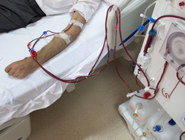The results of a pioneering UK-wide clinical trial that compared treatments for patients with a common type of kidney disease has found one to be significantly more effective. The results of the study, published online in The Lancet today [9 Jan], will be recommended to clinicians worldwide as the most effective approach to treating the condition.
The Medical Research Council-funded study, led by researchers from the University of Bristol’s Academic Renal Unit based in Southmead Hospital, compared three treatment approaches in a type of kidney disorder known as ‘membranous nephropathy’.
The condition, which leads to changes and inflammation of the structures inside the kidney that help filter wastes and fluids, is usually managed with immunosuppressive drugs but has a high risk of causing kidney failure in patients. Previous studies of the disorder, which is costly to treat (kidney failure treatments cost $40 billion in the US in 2008), show that once kidney function starts to decline, continued deterioration can be expected.
The research team, led by Professor Peter Mathieson, Dean of the Faculty of Medicine and Dentistry, carried out a randomised controlled trial involving 108 patients with 20 per cent decline in renal function at 37 renal units across the UK. The patients were randomised to one of three treatment approaches and followed up by the team over three years.
The team evaluated results from 33 patients who were treated with prednisolone and chlorambucil, 37 patients with ciclosporin, and 38 patients who were provided with supportive therapy alone.
They found that for patients with membranous nephropathy, six months’ therapy with alternating monthly cycles of prednisolone and chlorambucil was the most effective option. This approach was shown to be the most effective in preventing further renal decline in patients with the benefits maintained over the three-year study period and thus the recommended treatment approach.
Professor Mathieson, the study’s lead author and Dean of the Faculty of Medicine and Dentistry at the University, said: “Kidney failure is a devastating condition that is difficult and expensive to treat and our best strategies are to aim to prevent it wherever possible by more effective treatment of the underlying kidney problems. This clinical trial took a very long time to complete and I was helped by kidney specialists, research nurses and patients in Bristol and all over the UK. The results improve the evidence-base for our treatments in this form of kidney disease.“
The study, entitled Immunosuppression for progressive membranous nephropathy: a UK randomised controlled trial, was funded by the Medical Research Council, Novartis, the Renal Association and Kidney Research UK and is published online in The Lancet. Professor Mathieson would particularly like to thank Tracey Chapman (trial administrator) and Maria Langdon (research nurse) both based in Bristol for all their hard work and the Medical Research Council for the principal funding.
